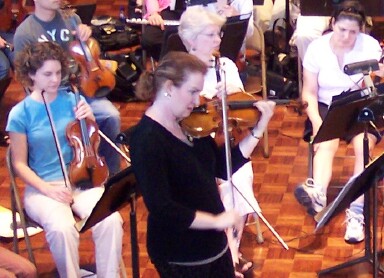American composer Tom Myron was born November 15, 1959 in Troy, NY. His compositions have been commissioned and performed by the Kennedy Center, the United States Holocaust Memorial Museum, the Portland Symphony Orchestra, the Eclipse Chamber Orchestra, the Atlantic Classical Orchestra, the Eastern Connecticut Symphony Orchestra, the Topeka Symphony, the Yale Symphony Orchestra, the Civic Orchestra of Chicago, the Bangor Symphony and the Lamont Symphony at Denver University.
He works regularly as an arranger for the New York Pops at Carnegie Hall, writing for singers Rosanne Cash, Kelli O'Hara, Maxi Priest & Phil Stacey, the Young People's Chorus of New York City, the band Le Vent du Nord & others. His film scores include Wilderness & Spirit; A Mountain Called Katahdin and the upcoming Henry David Thoreau; Surveyor of the Soul, both from Films by Huey.
Individual soloists and chamber ensembles that regularly perform Myron's work include violinists Peter Sheppard-Skaerved, Elisabeth Adkins & Kara Eubanks, violist Tsuna Sakamoto, cellist David Darling, the Portland String Quartet, the DaPonte String Quartet and the Potomac String Quartet.
Tom Myron's Violin Concerto No. 2 has been featured twice on Performance Today. Tom Myron lives in Northampton, MA. His works are published by MMB Music Inc.
FREE DOWNLOADS of music by TOM MYRON
Symphony No. 2
Violin Concerto No. 2
Viola Concerto
The Soldier's Return (String Quartet No. 2)
Katahdin (Greatest Mountain)
Contact featuring David Darling
Mille Cherubini in Coro featuring Lee Velta
This Day featuring Andy Voelker
|
|
|
|
| 
Wednesday, May 17, 2006
A Contradicting Magic

Elisabeth Adkins rehearsing my Violin Concerto #2 with the Eclipse Chamber Orchestra, May 13, 2006
"In any art there is a Higher Regularity which seems to conventional people arbitrary and to unconventional people commonplace: Irene's singing was of this sort. And of all the singers I have ever heard she was the most essentially dramatic: she could not have sung a scale without making it seem a part of someones life, a thing of human importance. Yet when the song and her voice said: 'We are all dying' something else about her voice- a quality that could not be localized, that all the sounds possessed together and none possessed apart- said to you also: 'Whoever dies?' Over feeling and act, the human reality, her voice seemed to open out into a contradicting magic of speculation and belief, into the inhuman reality men discover or create. Her voice pushed back the boundaries of the world."
Randall Jarrell
"Pictures From An Institution"
posted by Tom Myron
|
| |



